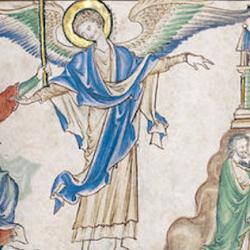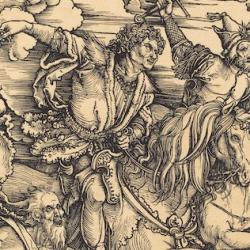Warren Gage presents a compelling case for the conclusion that the harlot of Revelation 17-18 becomes the bride of chapter 21, or at least that many escape from the city of the whore to inhabit the bride-city that comes from heaven. Gage rests a good bit of his case on a Joshua typology that runs through Revelation. Some of the salient points are:
1) Both “Babylon” in Revelation and Jericho are “great cities” and filled with wealth. Achan actually finds Babylonian treasure in Jericho (Joshua 7:21).
2) Two witnesses appear in Babylon and are killed, matching the two spies in Joshua.
3) There is a prostitute in Jericho and in Babyolon.
4) Jericho falls when the priests blow trumpets; Babylon falls after trumpets and bowls. At the end of the trumpet sequence in Revelation, the ark of the covenant appears (11:19).
5) Both cities are burned with fire.
Given this typology, we would expect the “Rahab” of Revelation to be saved, as was the original Rahab.
The Exodus typology that also runs through the book lends further support to this (admittedly, this is conjectural). Israel left Egypt accompanied by a mixed multitude of Egyptians and other Gentiles, who had no doubt concluded that Egypt was no longer a pleasant place to settle down. When Roman troops started amassing in Judea in the late 60s AD, many in Jerusalem would have drawn the same conclusion. The “exodus” from Jerusalem is not merely an exodus of people who have long been Christians, but the exodus of a mixed multitude. It is entirely likely that many Jews who escaped Jerusalem and looked back to see the city destroyed would have embraced Jesus as prophet and Messiah. They had been Rahab; but they were married finally to Jesus.
In short, when the voice from heaven commands “Come out of her, my people, that you may not participate in her sins and that you may not receive of her plagues” (18:4), we have reason to believe that some, perhaps many, heeded that call. The gates of the city that comes from heaven, after all, are labeled with the names of the tribes of Israel (21:12).














